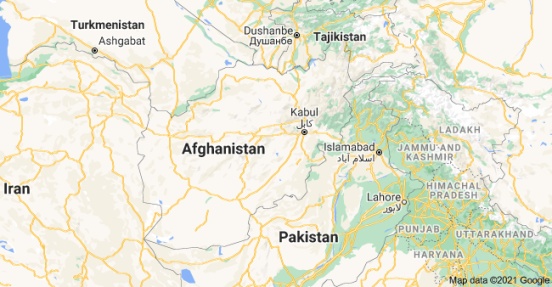The Afghan government after a meeting of its security council has vowed to fight the Taliban, which has reached the gates of Kabul after a string of victories.
"It was decided with conviction & resolve that WE STAND FIRM AGAINST TALIBAN TERRORISTS & DO EVERTYHING [sic] TO STRENGTHEN THE NATIONAL RESISTANCE BY ALL MEANS AND WAYS. PERIOD," First Vice President Amrullah Saleh tweeted after a national security meeting chaired by President Ashraf Ghani. "We are proud of our [armed forces]."
Despite the lightning advance of the Taliban, some Afghan watchers predict a long Civil War in the country, which was once a buffer between the British and Russian empires.
"Britain found that out in the 1830s, that it is a country led by warlords and led by different provinces and tribes, and you end up, if you're not very careful, in a civil war, and I think we are heading toward a civil war," British Defence Secretary Ben Wallace told the BBC.
Both the Afghan government and the Iranian media have called for a popular resistance, signalling a budding intent to engage in irregular warfare, based on guerrilla warfare tactics.
Also read: Taliban escalates mind games as city- after– city falls in Afghanistan
A writeup on the homepage of IRNA, Iran’s state-run news agency said that an article attributed to an Iranian analyst on the homepage of the IRNA, the state-run news agency, says it is essential to garner international support for “popular mobilization forces”—a term usually reserved for irregular warfare forces, to restore the military balance in Afghanistan.
Foreign Policy Analyst Pir Mohammad Mollazehi told IRNA that the “balance of power… is in favour of the Taliban, but it should be balanced, and that needs international support for popular mobilization forces because the Taliban would not accept any consensus and it insists on forming an Islamic emirate…”
Despite the willingness not to throw in the towel, the Taliban are on the gates of Kabul, focusing on controlling supply lines that lead into the Afghan capital.
The Taliban got a morale booster, earlier this week, when they captured in the south, Kandahar, the extremist group’s birth place.
Two other cities fell along the Kandahar-Kabul route. One was Ghazni and the other was Lashkar Gah.
Towards the west, Herat, Afghanistan’s third largest city on the gates of Iran also fell to the Taliban, and its warlord and symbol of resistance, Ismail Khan, was captured. Finally, in the north, the city of Kunduz fell to the Taliban. All together an attempt is being made to choke Kabul through Taliban’s control of the city’s supply lines.
The Taliban’s swift advance has triggered a mass exodus of refugees in the neighbouring countries, causing an acute humanitarian crisis. The UN estimates that around 400,000 civilians have been driven from their homes since the beginning of the year, 250,000 of them since May, Reuters quoted a UN official as saying.
United Nations Secretary-General Antonio Guterres warned that "Afghanistan is spinning out of control" and urged all parties to do more to protect civilians.
"This is the moment to halt the offensive. This is the moment to start serious negotiation. This is the moment to avoid a prolonged civil war, or the isolation of Afghanistan," Guterres told reporters in New York.
Many people in the capital were stocking up on food as well as first aid, residents said. People were thronging at embassies in their thousands to apply for a visa.
Amid the prevailing chaos, the United States is organising a massive pull-out of its staff from Kabul. The Pentagon has pushed a brigade, comprising around 3,000 troops by Sunday evening. "They have arrived, their arrival will continue “till tomorrow," the U.S. official told Reuters.
Besides, an infantry brigade combat team will also move out of Fort Bragg, North Carolina, to Kuwait to standby to impart additional security if required, the Pentagon has said.
Britain and several other Western nations are also sending troops to complete the pull-out.
Staging a hasty exit, the embassies of western countries in Kabul have started burning sensitive information recorded on paper and electronic devices as the Taliban insurgents are advancing at lightning speed and the Afghan capital could fall into their hands in a matter of days, India Narrative reported earlier.
According to a Reuters news agency report, the U.S. embassy in Kabul has provided burn bins and an incinerator to destroy “sensitive material” including papers and electronic devices.
Also Read: US embassy in Kabul burning secret papers & electronic devices as Taliban closes in
In tune with its advance, the Taliban stepped up its mind-games to win the war without firing a shot. The first target of the propaganda offensive of the Taliban, which wants residual resistance to collapse, without firing a shot, was the Afghan military.
"The rapid progress of Taliban units is a sign of the movement’s popularity," the Iran Student News Agency (ISNA) said, quoting a Taliban statement. "Those who fought against the Taliban have nothing to be afraid of. We all can live in peace. We are your brothers. If anyone attacks you on behalf of the Taliban, immediately report to our headquarters, and we will deal with them," the statement added.
Also read: Taliban capture Ismail Khan, the Lion of Herat, as city falls
The group vowed amnesty to pro-government army servicemen and declared inviolability of private and state property.
Simultaneously the mind games targeted foreign governments, including India, which has solidly supported the Afghan government led by President Ashraf Ghani.
In an interview with ANI, Taliban warned that India should not militarily intervene in Afghanistan. In return, India was welcome to carry on with its humanitarian assistance to Afghanistan.




















